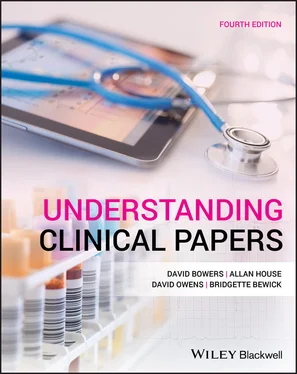David Bowers - Understanding Clinical Papers
Здесь есть возможность читать онлайн «David Bowers - Understanding Clinical Papers» — ознакомительный отрывок электронной книги совершенно бесплатно, а после прочтения отрывка купить полную версию. В некоторых случаях можно слушать аудио, скачать через торрент в формате fb2 и присутствует краткое содержание. Жанр: unrecognised, на английском языке. Описание произведения, (предисловие) а так же отзывы посетителей доступны на портале библиотеки ЛибКат.
- Название:Understanding Clinical Papers
- Автор:
- Жанр:
- Год:неизвестен
- ISBN:нет данных
- Рейтинг книги:3 / 5. Голосов: 1
-
Избранное:Добавить в избранное
- Отзывы:
-
Ваша оценка:
- 60
- 1
- 2
- 3
- 4
- 5
Understanding Clinical Papers: краткое содержание, описание и аннотация
Предлагаем к чтению аннотацию, описание, краткое содержание или предисловие (зависит от того, что написал сам автор книги «Understanding Clinical Papers»). Если вы не нашли необходимую информацию о книге — напишите в комментариях, мы постараемся отыскать её.
Understanding Clinical Papers — читать онлайн ознакомительный отрывок
Ниже представлен текст книги, разбитый по страницам. Система сохранения места последней прочитанной страницы, позволяет с удобством читать онлайн бесплатно книгу «Understanding Clinical Papers», без необходимости каждый раз заново искать на чём Вы остановились. Поставьте закладку, и сможете в любой момент перейти на страницу, на которой закончили чтение.
Интервал:
Закладка:
31 Chapter 31Figure 31.1 A hypothetical 2 × 2 contingency table showing sample frequencie...Figure 31.2 Use of the χ 2test in a comparison of additional catheter‐d...Figure 31.3 Relative risks (risk ratios) for causes of poor outcome in patie...Figure 31.4 Odds ratios and adjusted (for social class) odds ratios (and 95%...Figure 31.5 Results of two‐sample t ‐test to compare outcomes from two treatm...
32 Chapter 32Figure 32.1 Scatterplot of hypothetical Glasgow Coma Scale scores given to 1...Figure 32.2 Scatterplot of percentage mortality from aortic aneurysm in 16 h...Figure 32.3 Scatterplot of the Patient‐Reported Outcomes Measurement Informa...Figure 32.4 Pearson correlation coefficients (and p ‐values) between adult mo...Figure 32.5 Spearman correlation coefficients between breast size and a numb...
33 Chapter 33Figure 33.1 Assessing agreement with Cohen's or Fleiss' κ .Figure 33.2 Agreement about types of intercranial haemorrhage between three ...Figure 33.3 Injury Severity Scores (ISS) given by two observers to 16 trauma...Figure 33.4 Bland–Altman plots of Patient‐Reported Outcomes Measurement Info...
34 Chapter 34Figure 34.1 The main components of a linear regression model.Figure 34.2 Scatter plot of birthweight against cord serum EPA acid concentr...Figure 34.3 Results of multiple linear regression from a prospective study t...Figure 34.4 A simple coding design for the nominal variable Ethnic group of ...
35 Chapter 35Figure 35.1 Multivariable logistic regression model for the association betw...Figure 35.2 Multivariate logistic regression analysis of effects of method o...
36 Chapter 36Figure 36.1 Incident rate ratios ( IRR s) and their 95% confidence intervals, ...Figure 36.2 Risk ratios and 95% confidence intervals, for effect of adherenc...Figure 36.3 Distribution of days of sickness absence among pregnant women in...Figure 36.4 Results (simplified) from a zero‐inflated Poisson regression mod...Figure 36.5 Incidence rate ratios ( IRR s), from a cross‐sectional study into ...Figure 36.6 Goodness‐of‐fit (as measured by log‐likelihood) of four regressi...
37 Chapter 37Figure 37.1 Kaplan–Meier survival curves from a randomized trial of the effe...Figure 37.2 Kaplan–Meier analysis of post‐progression survival (PPS) in the ...Figure 37.3 Hazard ratios showing the association between several individual...
38 Chapter 38Figure 38.1 Based on Facchin and Margola (2016).Figure 38.2 Sample of three themes and corresponding meaning units. From a s...Figure 38.3 Illness narratives among drug users living with HIV/AIDS.Figure 38.4 A theory of reconciling incompatibilities.
39 Chapter 39Figure 39.1 Extract from a results section to illustrate the interplay of te...Figure 39.2 Extract from a results section to illustrate more complex interp...Figure 39.3 Abstract from a clinical trial to illustrate the setting out of ...Figure 39.4 Abstract from a case–control study to illustrate the setting out...Figure 39.5 How the clarity of a table depends on its layout and the legend....Figure 39.6 How the clarity of a table depends on its layout and the legend....Figure 39.7 A table that successfully uses brackets, dashes and the word ‘to...
40 Chapter 40Figure 40.1 Trial profile, showing who was potentially eligible and what hap...Figure 40.2 Pie chart, showing categories of otology cases discussed at mult...Figure 40.3 Bar chart comparing disease prevalence before and after fly cont...Figure 40.4 Bar chart with error bars.Figure 40.5 Line graph with error bars, showing mean sleep durations for var...Figure 40.6 Stacked bar charts displaying a pattern over time.Figure 40.7 Chart using horizontal marks (with error bars) to indicate relat...Figure 40.8 Histograms shown in a hybrid figure (also showing a scatterplot)...Figure 40.9 A comparison of two box plots (or box‐and‐whisker charts) accomp...Figure 40.10 An infographic – carefully selected material from a clinical gu...
41 Chapter 41Figure 41.1 A Discussion that starts with a résumé of the study findings bef...Figure 41.2 Critical appraisal of a study's results.Figure 41.3 A summary box which outlines a study's importance and main findi...
Guide
1 Cover
2 Table of Contents
3 Begin Reading
Pages
1 iii
2 iv
3 vii
4 viii
5 ix
6 x
7 xi
8 xii
9 1
10 3
11 4
12 5
13 6
14 7
15 8
16 9
17 10
18 11
19 12
20 13
21 14
22 15
23 16
24 17
25 18
26 19
27 20
28 21
29 23
30 24
31 25
32 26
33 27
34 28
35 29
36 30
37 31
38 32
39 33
40 34
41 35
42 36
43 37
44 38
45 39
46 40
47 41
48 42
49 43
50 44
51 45
52 46
53 47
54 48
55 49
56 50
57 51
58 52
59 53
60 54
61 55
62 56
63 57
64 58
65 59
66 60
67 61
68 62
69 63
70 64
71 65
72 66
73 67
74 68
75 69
76 70
77 71
78 72
79 73
80 74
81 75
82 76
83 77
84 79
85 81
86 82
87 83
88 84
89 85
90 86
91 87
92 88
93 89
94 90
95 91
96 92
97 93
98 94
99 95
100 96
101 97
102 98
103 99
104 100
105 101
106 102
107 103
108 104
109 105
110 107
111 109
112 110
113 111
114 112
115 113
116 114
117 115
118 116
119 117
120 118
121 119
122 120
123 121
124 122
125 123
126 124
127 125
128 126
129 127
130 128
131 129
132 130
133 131
134 132
135 133
136 134
137 135
138 136
139 137
140 138
141 139
142 140
143 141
144 142
145 143
146 144
147 145
148 146
149 147
150 148
151 149
152 150
153 151
154 153
155 155
156 156
157 157
158 158
159 159
160 160
161 161
162 162
163 163
164 164
165 165
166 167
167 169
168 170
169 171
170 172
171 173
172 174
173 175
174 176
175 177
176 178
177 179
178 180
179 181
180 182
181 183
182 184
183 185
184 186
185 187
186 188
187 189
188 190
189 191
190 192
191 193
192 194
193 195
194 197
195 199
196 200
197 201
198 202
199 203
200 204
201 205
202 206
203 207
204 208
205 209
206 210
207 211
208 212
209 213
210 214
211 215
212 216
213 217
214 218
215 219
216 220
217 221
218 222
219 223
220 224
221 225
222 226
223 227
224 228
225 229
226 230
227 231
228 232
229 233
230 234
231 235
232 236
233 237
234 238
235 239
236 240
237 241
238 242
239 243
240 244
241 245
242 246
243 247
244 248
245 249
246 251
247 252
248 253
249 254
250 255
251 256
252 257
253 258
254 259
255 260
256 261
257 262
258 263
259 264
260 265
261 266
262 267
263 268
264 269
265 270
266 271
267 272
268 273
Читать дальшеИнтервал:
Закладка:
Похожие книги на «Understanding Clinical Papers»
Представляем Вашему вниманию похожие книги на «Understanding Clinical Papers» списком для выбора. Мы отобрали схожую по названию и смыслу литературу в надежде предоставить читателям больше вариантов отыскать новые, интересные, ещё непрочитанные произведения.
Обсуждение, отзывы о книге «Understanding Clinical Papers» и просто собственные мнения читателей. Оставьте ваши комментарии, напишите, что Вы думаете о произведении, его смысле или главных героях. Укажите что конкретно понравилось, а что нет, и почему Вы так считаете.












